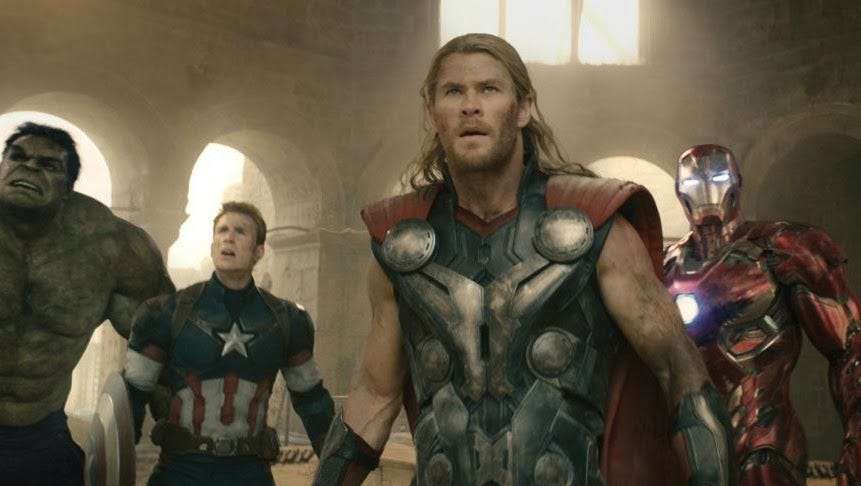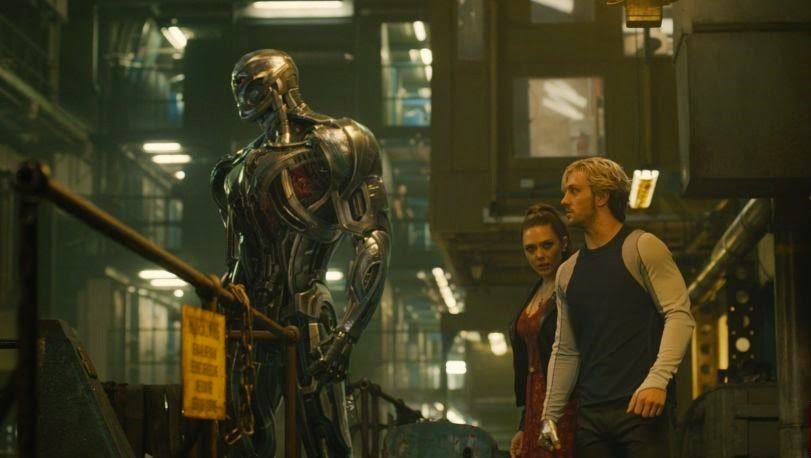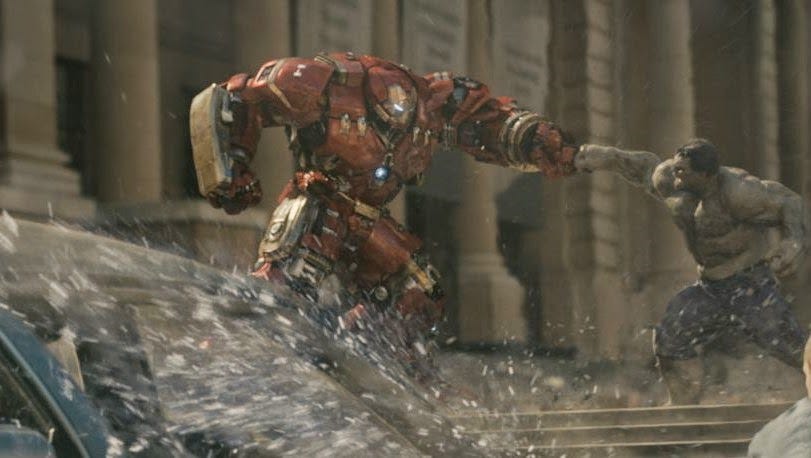Review: "Avengers: Age of Ultron" is expert superhero spectacle with a voice and a heart

Avengers: Age of Ultron is very, very much a Joss Whedon movie, and for that alone, I kind of love it.
Beat for beat, moment for moment, Age of Ultron has a more specific sense of voice than most major superhero movies, even those in the Marvel universe. It is of a piece with what has come before, absolutely, but it is also strange, glib, imaginative, and supremely heartfelt in ways that make Whedon’s signature clear from beginning to end. His love for these characters and affection for the conventions that dictate their lives is obvious and sincere, but so is his joy in arranging those characters in unfamiliar patterns, or sending them in directions that interrogate who they are, or taking said conventions and undermining them with a gleeful wink. He is willing to push things dark, to focus on the small-scale and personal even in the midst of enormous action mayhem, but always with an eye for levity. That devotion to maintaining a sense of fun, no matter what else comes, has always been one of the most admirable parts of Whedon’s creative identity, and it is on full display here.
What I find most impressive about the film, then, is that this sense of voice comes across so strongly, so unceasingly, in the midst of a giant action blockbuster that features no less than five major set-pieces, a narrative sandwiched right at the crossroads of Marvel’s broader movie plans, and at least 10 main characters, in addition to a much larger swath of supporting players. Age of Ultron is positively massive, in scope, mechanics, and ambition, and that Whedon keeps this train chugging along at all, let alone with the joyous sense of balance and enthusiasm that permeates the proceedings, is a bit of a miracle. The film isn’t perfect, and ultimately feels a tad less consequential than Marvel’s highest watermarks – Whedon’s own original Avengers and last year’s Captain America: The Winter Soldier, namely – but in its best moments, Age of Ultron is the most impressive thing the company has yet achieved, and as a whole, it is a rather glorious personification of the interwoven comic-book storytelling Marvel has strived to create from day one.
Continue reading after the jump...
Whedon certainly has a lot of masters to serve here, and the film does falter when forced to kowtow to the building narrative of the larger cinematic universe. Where the first Avengers could operate almost purely as pay-off, all roads leading squarely to that initial destination, Age of Ultron is a middle chapter in something far larger, and frankly, at this point, I don’t need to hear anything more about the ‘infinity gems’ or greater cosmic threats until Marvel is actually ready to play that hand. Thor: The Dark World and Guardians of the Galaxy also suffered from their central narrative device ultimately being 1/6 of a prelude to a story in the distant future, and in Age of Ultron, that problem seems magnified, the mechanics of foreshadowing serving both to make certain plot turns clunky – a second-act detour for Thor feels more obligatory than essential – and rendering the individual narrative of this particular film more inconsequential than Whedon or Marvel probably intended. The Ultron story itself gets a very good beginning, middle, and end here, but the narrative direction of the overall Marvel canon makes the adventure feel less like something seismic – as the original Avengers did – than like an ultimately minor stumbling block on the way to confronting larger threats.
But if Age of Ultron suffers from a problem all too common to major movie sequels, it also takes advantage of the possibilities a sequel affords in ways few movies ever do. The satisfaction that comes from seeing all these individual characters together again, each having come a long way since last they met, is immense, and the addition of a rather significant host of new figures doesn’t bog things down, but liven it all up. Whedon is clearly overjoyed to have such a big toy box to play with here, and he delights in pairing up the ensemble in all manner of different permutations – some fleeting and others more dramatic – and shining the spotlight in every possible direction.
In fact, one of the greatest strengths of Age of Ultron lies in exactly where Whedon chooses to keep that spotlight most brightly lit. Our main three standalone heroes – Iron Man (Robert Downey Jr.), Cap (Chris Evans), and Thor (Chris Hemsworth) – each get great moments here, and are essential to the driving action of the film, but I would argue the most significant characters this time around, on both narrative and thematic levels, are those figures who don’t have movies of their own. Black Widow (Scarlett Johansson), the Hulk (Mark Ruffalo), and especially Hawkeye (Jeremy Renner) feel like the main focus here, and the directions in which Whedon pushes all three of them are the movie’s greatest strengths. Hawkeye has a series of standout sequences that prove a heavy-hitter like Jeremy Renner was indeed the right man for the job, including a third-act speech that serves, to me, as the rousing denouement of the entire picture. Johansson and Ruffalo, meanwhile, are given what is easily their meatiest material in the Marvel universe to date, and while the romantic arc that binds them together could tip over into pandering nonsense in less capable hands, their performances and Whedon’s sharp writing makes the pair the film’s heart and soul.

The nature of Heroism – with a capital ‘H,’ as in the optimistic, archetypal comic-book sense of the word – is the core theme of Age of Ultron, and one Whedon takes seriously (proof that such issues need not be rendered ‘gritty,’ as in the Christopher Nolan/Zack Snyder model, to be meaningful – in fact, this is a much smarter and more thoughtful superhero film than theirs). While every single person in the movie grapples with it at one point or another, always in supremely satisfying ways, the dilemma is perhaps at its most poignant with Black Widow and Hulk, and at the intellectual forefront with the quartet of new characters Whedon brings along for the ride. Between big bad Ultron (James Spader), twins Wanda and Pietro Maximoff (Elizabeth Olsen and Aaron Taylor-Johnson), and mysterious-figure-I-cannot-talk-about-for-fear-of-spoilers-but-who-is-so-goddamn-awesome The Vision (Paul Bettany), only Pietro, it could be argued, gets the short shrift (and while I think Whedon does very cool visual work with him, one probably must concede that Bryan Singer used the character, also known as Quicksilver, more memorably in last year’s X-Men: Days of Future Past). But it is also at the intersection of these four characters – one a being of pure evil, one of pure good, and two stuck very much in the middle – that Whedon lets the film’s core morality play simmer, and it largely works like gangbusters. I can quibble that Spader’s Ultron is probably a tad less intimidating than I would have liked – a victim of Whedon’s ever-present gift for gab, which is mostly a boon to the film – but Olsen and Bettany are both so good in their roles, their characters such immediately gripping parts of the Marvel universe, that the new cast is, on the whole, a rousing highlight.
Whedon maintains an amazingly firm sense of balance between these many, many characters, especially considering at what a fast clip the film moves. At 141 minutes (a minute shorter than the previous film, yet with a whole lot more to accomplish), the film moves by at a rather breathless clip, and I cannot imagine anyone walking out of the theatre feeling particularly fatigued. If anything, Age of Ultron probably could have used another 10 to 15 minutes just for breathing room; the best scenes in the movie are those small exchanges between the characters, or the wonderfully bizarre, nightmarish interludes prompted by Wanda’s telekinetic powers, both of which play, more than anything else, like vintage Whedon, cutting loose and diving deep. There is a healthy amount of both types of scenes in the existing cut, but the film might feel even weightier with more, and I wonder if a slightly more leisurely pace would leave the end result packing more of a punch.
Certainly, there is nothing left to be desired in the action set pieces, which are as creative, thrilling, and beautifully executed as one could hope for. Nothing in this film quite rises to the level of the visceral earth-level set pieces in The Winter Soldier, or the initial thrill of discovery of seeing the Avengers assemble in the final act of their first film, but what I like about the spectacle in Age of Ultron is that it never attempts to ‘top’ or repeat what came before. Each action sequence here is a little unlike anything else we’ve seen in the Marvel universe thus far, and each employs the mammoth ensemble to its fullest, crafting interwoven set pieces that are, at their best, a little mind boggling. And the promised ‘Hulkbuster’ fight featured front and center in all of the film’s marketing? It delivers, in a very big way, and feels in part like a conscious retort to the wanton destruction of Zack Snyder’s Man of Steel. It will certainly please a great deal of fans to no end, and deservedly so.

Any spoiler-free take on Age of Ultron is merely scratching the surface, and any discussion, no matter what the depth, is likely to leave a great many things on the table, because if nothing else, the film is an embarrassment of riches. I can understand the lukewarm reception the film is getting in some circles, both because it is aimed squarely at the hearts of die-hard Marvel fans – casual superhero onlookers or those who don’t find the genre to their liking will almost certainly feel alienated – and because, as well as it does everything it does, this one does lack the feeling of ‘discovery’ that made the original Avengers such an immense delight.
But I look at the number of individual moments I loved in this movie, and at the sheer tonnage of characters expertly serviced by Whedon’s writing, or at the near-constant laughter and pervasive sense of joy I felt watching it, and I cannot help but think any negative take sounds a tad ungrateful. Here is a film with a budget of near historical proportions, existing as one piece in a much larger cinematic puzzle, and with more characters than should reasonably be allowed. It should be smothered under its own weight almost instantly, and yet it soars, with a voice and passion that is sure to be unlike anything else in theatres this summer. I do not demand perfection to be impressed. An achievement such as this is more than enough to fill me with awe.
Follow author Jonathan Lack on Twitter @JonathanLack

